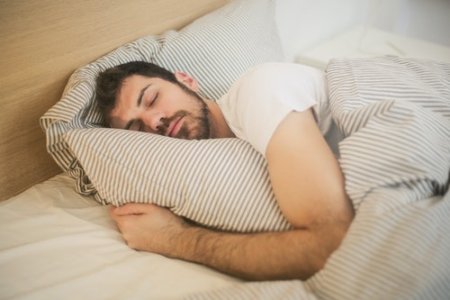Sleeping better during Covid-19 is challenging. The coronavirus pandemic has upset routines, requiring individuals to stay at home and away from work, family members, gyms, events, and friends. Because of this, sleeping is becoming a problem for people that previously had no sleep difficulties, as stated by the National Sleep Foundation.
Health care workers are probably not surprised that more than a third of healthcare workers in China suffered insomnia throughout the coronavirus pandemic, according to a study published in Frontiers in Psychiatry.
However, it is not just frontline workers that are currently suffering. Fear and isolation have taken a toll on everybody, resulting in restless and long nights.
Anxieties associated with a lack of control and understandable as we shelter in place throughout the COVID-19 pandemic. While there is a natural fear response is par for the course, too much stress can be problematic.
Rather than spending time and energy worrying, why not channel that energy into what you can control — self-care. Focusing on sleep is a natural method for working on self-care, as we all know that by getting enough sleep better, your immune system can be benefited.
There are methods to combat insomnia and sleeplessness. We asked experts about how to manage insomnia during the pandemic.
Q & A: To Help Improve Your Sleep Better Throughout the Coronavirus Pandemic
Lots of people can not sleep better because they are worried about their health, families and friends, and financial situation.
1. What can they do?
When we go to bed, as we have nothing to do, our minds are exposed to worrying. Setting time aside where you can sit down and concentrate on the worries, you are not staying up stressing. Like before dinner or just after dinner.
It helps in writing down these concerns. Make a list, so it’s tangible and concrete and more palatable.
When bedtime comes along, do something relaxing for an hour before sleeping like reading a book, speaking to a relative, perhaps spending time petting an animal.

2. Is it OK to allow our minds to worry?
If you spend time avoiding distress, you don’t have time to digest or metabolize them. Your mind makes it possible to find a solution when you be concerned about it. If you worry about your mother, you can give a call to her. But preventing never helps; it makes you anxious.
3. Why do we have difficulty sleeping even if we are exhausted?
What happens with stress is that our nervous system will trump our call to sleep. This makes sense from an evolutionary perspective. Think back to the times we lived in a cave. We needed to be alert. Our night vision was awful. We do not climb well. This system is a basic system that keeps us awake since our system believes there is a threat.
4. What can we do to improve sleep?
Do not go to the bedroom if you are not sleepy. Limit napping and do not drink caffeine. Get out of bed if you are lying there, tossing and turning, and go to a different room. You have to associate the bed with sleeping and stick to a regular schedule. Our mind is learning and making connections. It’s like feeding a dog. The dog pairs food with coming to the table. If we pair wakefulness and anxiety with a bed, we then learn the behavior of being awake in bed.
Let us create the bedroom, only a place to sleep better. Do not work in bed or avoid spending wakeful time in bed. For people that are confined to the bed, they could use a part of the bed for reading or watching tv and another portion for sleeping, for instance.
5. At what point should people try medication?
There is a lot we could do before medicine: Set a workplace aside outside the bedroom, wear blue light blocking specs, dim the lights two hours before bed, make sure lights are glowing in the morning, no late meals, no alcohol, exercise every day, avoid caffeine after lunch, and have a relaxing shower or bath before shifting into your pajamas.
Sunlight helps to keep individuals on a sleeping schedule. So during the day, it is essential to keep curtains open day.
If you have done these things and done them well, and a week or so into it, you are still waking up feeling exhausted.
At that time, you need to get help. There are some over-the-counter possibilities, like melatonin and Benadryl and a few herbal ones. But before going to purchase some of them, consult your family doctor. Even though they don’t require prescriptions to get, they can be problematic, particularly with other medications.

6. When should someone seek medical assistance?
Two weeks of two or more nights of poor sleep should make someone seek assistance.
The diagnostic standards for insomnia are trouble falling sleep three days per week for three months.
7. With the lockdown order and loss of jobs, is boredom causing sleep difficulties?
Boredom, in itself, isn’t an issue. The problem there is one of despondency, of lack of trust or emptiness. Most people, if they are bored, can find something to do unless they’re sad and depressed, which prevents them from getting up and having things to do, Doghramji stated. What we’re talking about is depression. The solution is to find something meaningful, do research on the net, find another job.
8. How does the lack of routine influence sleep?
The one habit that important is waking up and getting out of bed at the same time, Doghramji said. We are likely to slip when we’re indoors and don’t have a daily schedule. So, our morning waking time slides into a later and later time. If there is nothing planned, get up and do something and become exposed to light.
9. What type of sleeping problems are people having during the pandemic?
It takes them longer to fall asleep. They wake up more at night. They wake up not revived, dizzy, or still tired. They are bothered by dreams and painful feelings, or they seem to like their sleep are shallow.
The emotional aspects are a significant factor. They are concerned about their safety or the safety of friends and relatives. Many may have friends who are infected with the virus, and some have had deaths in the family. The sort of lifestyle people are currently living: They are at home and settled. That contributes to poor sleep. They want the light to sync their circadian beat. We are all more socially isolated. We all want socialization to feel emotionally healthy and restored to sleep better.
10. Can sleep difficulties that came from this pandemic chronic and long term?
Once we’ve got something that causes sleeplessness, even if it causes it disappears, insomnia might persist. People today tend to worry about not sleeping, so the brain is a powerful tool in helping to sleep. Try meditation, mindfulness, or discuss what worries you to try to stop the reoccurring or racing thoughts. Break that cycle.
This is treatable with building better sleep habits. And the worst of the sleeping issues should ease up once the source of the anxiety is over.
11. Can sleep help the immune system fight the coronavirus?
Adequate sleep boosts the immune system, which decreases the risk of infection and can improve outcomes for people fighting a virus. On the other hand, sleeplessness weakens the body’s defense system and makes people more vulnerable to contracting an infection.
12. Can sleep help improve mood and productivity during this pandemic?
It’s hard to work at our best without an easy way to our natural coping skills (e.g., exercise, social support, etc.) while sheltering in place. Sleep better can maximize your potential for having better days under these conditions. Optimal sleep helps improve brain function, regulate mood, and increase energy and overall productivity during the day.
13. Why are so many people having difficulty sleeping while sheltering in place?
Higher stress and an overload of information can keep the mind racing and enhance the body’s arousal system response, causing insomnia.
People are utilizing every waking moment getting one last look at their screens ( COVID-19 education, news updates, social connections). The blue light from these screens alerts the brain to stop producing the sleep hormone melatonin, which may result in trouble falling asleep.
Additionally, loss of daytime structure can upset nighttime sleep schedules. Wake times and bedtimes can shift the pressure, or urge, to sleep, making the ability to fall asleep less expected.
Ultimately, depressed mood, low energy, and more downtime can increase long napping, making it more difficult to fall asleep at night.
14. What can help to sleep better?
Sleep is a must at this time. Here’s how changing habits can help improve your sleep:
Create a sleep schedule.
Find out your sleeping need (experimentation with various amounts), then prioritize that amount of sleep every night. While six or nine hours may be appropriate for some adults, most need seven to eight hours. We’re not obliged to late-night social activities, so getting to bed” on time” is much more realistic right now — take advantage of this.
Limit screen time at night. Switch off your device’s one-hour bedtime. Leave your mobile phone charging at the kitchen, so you’re not tempted to look at COVID-19 updates during the night.
Find your time.
Take the hour before bedtime without any electronic engagement. Minimize calls and conversations during that hour. That’s not easy, particularly if you have young children at home, but it’s necessary. All of us need at least one hour per day. Take a hot bath/shower, try a meditation app, play soothing music, and read a book or magazine.
Minimize Naps.
Daytime sleep must be less than 30 minutes and before 2 p.m. If you have any difficulty falling asleep, avoid napping.
Try Breathing Exercises.
Use ten slow breaths to fall asleep and return to sleep. It must be a slow inhale through your nose for 3 to 4 seconds, and a slow exhale by your mouth for 3 to 4 minutes.
Improve your sleep environment.
Ensure that your bedroom environment is conducive to sleep. Try blackout shades or an eye mask, keep the room temperature cool, and use a white noise machine to block additional noise from the hallway or the road.
Gain control over anxiety.
People have less access to coping strategies like time with friends and going to the gym. Try new hobbies and activities — painting, writing, photography, indoor exercise videos, etc.. Find ways to stay connected with family and friends. If the stress feels uncontrollable, consider treatment.
Structure your schedule.
Commit to daily activities (e.g., meals, exercise, socializing) at particular times to build a structure to your days. This may support a regular bedtime and wake up time. Set smartphone reminders to anchor your schedule and as a reminder to turn off screens an hour before bedtime.
While sleep is essential, try not to fret about it! Worrying about sleep turns into anxiety. Just do your best to go to sleep on time, and if there are issues, follow these hints. Ensure to always come back to “controlling the controllable.” You cannot control the outcome of your efforts, only the efforts themselves.